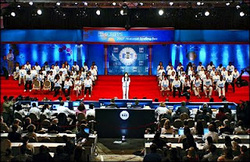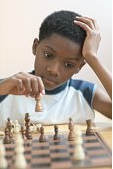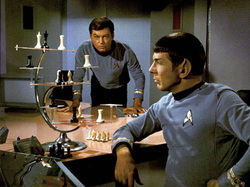
I hear it at least 20 times an hour from parents and teachers at any chess related event. Whether it's practice, a casual game at home, or a chess tournement, parents fill the air with praise for their little chess players. "Baby...you're a genius. I'm so proud of you!" Yet, this seems like the one of two places on the planet where children are herold in mass for looking, acting or actually being smart. The other place is the National Spelling Bee. I am a supporter of both.
Spelling Bees and Chess do something very unique for children. It is a rare and often missed opportunity for young people to be celebrated for what they know. I was recently amused and deeply please to see the National Beeing Bee Competition aired on ABC in primetime. All the cameras, announcers, sponsors and fanfare was quite inspiring. I dream of a time when we have cheerleaders and bands for our favorite high school chess teams. Well, in the meanwhile we have The Scripps National Spelling Bee.
Here's the point: We must celebrate the brains of all our children. Atheletics and academics receive tremendous support and recognition, evidenced by the abundance of scholarships and awards. However, the building blocks of strong academic performance and atheletic development is often found in the devleopment of special cognitive gifts. For example, a 7 year old who sits at the piano for the first time; or a struggling student who stubbles across a board game that just makes sense and finds himself excelling to the top of the rating scale. These are the building blocks of success.
I invite you to join me in supporting the genius of young chess players, who are on their way to capturing the attention of the nation.
Coach Hodge
Spelling Bees and Chess do something very unique for children. It is a rare and often missed opportunity for young people to be celebrated for what they know. I was recently amused and deeply please to see the National Beeing Bee Competition aired on ABC in primetime. All the cameras, announcers, sponsors and fanfare was quite inspiring. I dream of a time when we have cheerleaders and bands for our favorite high school chess teams. Well, in the meanwhile we have The Scripps National Spelling Bee.
Here's the point: We must celebrate the brains of all our children. Atheletics and academics receive tremendous support and recognition, evidenced by the abundance of scholarships and awards. However, the building blocks of strong academic performance and atheletic development is often found in the devleopment of special cognitive gifts. For example, a 7 year old who sits at the piano for the first time; or a struggling student who stubbles across a board game that just makes sense and finds himself excelling to the top of the rating scale. These are the building blocks of success.
I invite you to join me in supporting the genius of young chess players, who are on their way to capturing the attention of the nation.
Coach Hodge


 RSS Feed
RSS Feed
